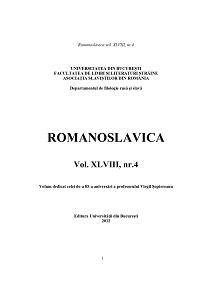O perspectivă etimologică asupra oiconimului „Moskva”
An etymological perspective on the oiconym "Moscow"
Author(s): Magdalena BodeaSubject(s): Semiotics / Semiology, Local History / Microhistory, Middle Ages, Eastern Slavic Languages, Philology, Translation Studies
Published by: Editura Universităţii din Bucureşti
Keywords: Moscow; history; toponymics; semiotics;
Summary/Abstract: Moscow, the capital of Russia and of Moscow region and the administrative center of the Central district, on the Moskva River near its junction with the Moscow Canal, is Russia’s largest city and a leading economic and cultural center. First tribes appeared on the territory of the future Moscow in the Neolithic epoch. The oldest settlements, dated as three thousand years before our era, were discovered within the area of the present-day city. In the second half of the first millennium of our era Slavic tribes occupied areas near Moscow, these were vjatichi, who are regarded as a kernel of the future Moscow population. The reference to Moscow as a town is registered in an old manuscript of 1147. In 1156, prince Yury Dolgoruky built timber walls around Moscow and he is frequently regarded as the founder of Moscow. So far Russian historians and linguists haven’t been able to establish the exact age of the city, to explain why it was Moscow that in the 15th century became the capital of the Russian state or to give a precise interpretation of the toponym/ hydronym Moscow. By common consent scholars consider that the fortress was named after the river flowing by and there are several theories regarding the exact translation of the word Moskva, based on the analysis of the name’s constituents which have been compared to words in very different languages. For example the Ugro-Finnish theory interprets the name of the Russian river as cow’s river or bear. The Indo-European translation of the term would be strong river or twisting/ rolling river. Nowadays most historians tend to accept the Slavic interpretation of the name Moscow as boggy, swamp, which reflects the natural characteristics of the landscape. The name Moscow/ Moskva is also believed to come from roots meaning dirty water. The mythological theory, the latest one about the Russian toponym’s origin, refers to the possibility of relating it to the totemic representations of the Slavic goddess Mokosh connected with female activities such as shearing, spinning and weaving. But neither of these interpretations has been yet accepted as the final one because of different geographical or etymological aspects and this subject is still very actual and controversial among Russian specialists.
Journal: Romanoslavica
- Issue Year: XLVIII/2012
- Issue No: 4
- Page Range: 31-48
- Page Count: 18
- Language: Romanian

